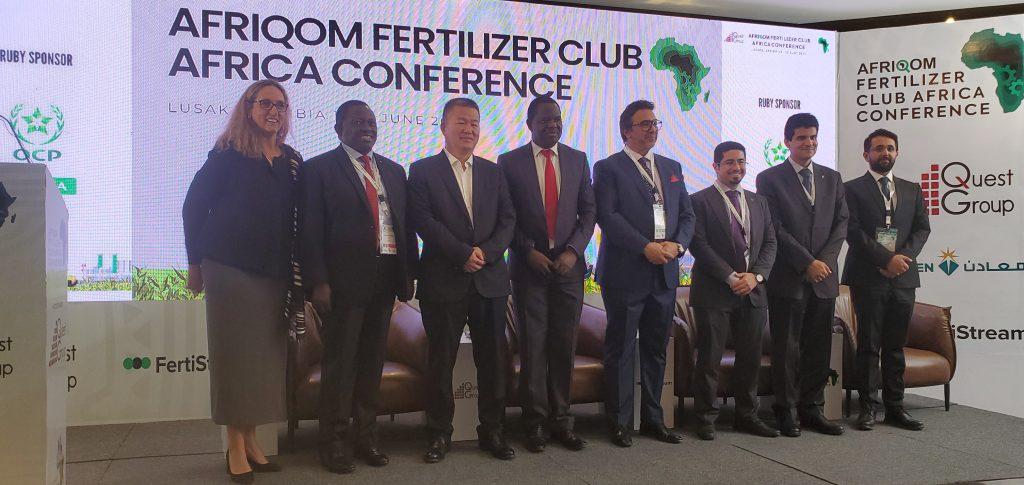“Zambia’s Fertilizer Frontier”

… Cultivating growth, collaboration, and sustainable agriculture on a global scale
By Francis Maingaila
Lusaka, Zambia24 – (June 11, 2024) – Zambia hosted a groundbreaking fertilizer conference organized by AFRIQUOM at CIELA Resort in the Choongwe area of Lusaka province, positioning itself as a key player in the global agricultural sector. The event brought together 150 high-level participants, including CEOs, directors, and government officials from around the world.
Themed “Invest, Develop, and Grow,” the conference highlighted Zambia’s potential to revolutionize its agricultural landscape.
Chizumba Shepande, Director in the Ministry of Agriculture, emphasized the pivotal role of fertilizers in enhancing Zambia’s agricultural productivity and sustainability, stressing their importance in ensuring food security and economic growth. He highlighted agriculture’s central role in Zambia’s economy, despite contributing only 30% to the GDP.
Shepande also pointed out a significant challenge: the untapped potential among small-scale farmers.
“Fertilizers play a crucial role in boosting crop yields and improving produce quality,” Shepande noted, advocating for greater access and affordability. He mentioned the Farmer Input Support Programme (FISP), instrumental in providing necessary subsidies for smallholder farmers.
Despite Zambia boasting one of the highest fertilizer consumption rates in the region, there’s a need for continued collaboration among stakeholders to drive further advancements.
“Innovation and technology must lead our efforts,” Shepande asserted, advocating for embracing new farming techniques and advanced fertilizer formulations.
Dr. Mounir Halima, CEO and Founder of AFRIQUOM, emphasized the global nature of the event, stating, “This is not just an African event, but a global one.”

Key participants included suppliers and traders from various countries, highlighting the conference’s international significance.
Zambia’s recent success in exporting fertilizer was highlighted as a significant achievement, positioning the country to not only meet domestic demand but also to begin exporting food.
The conference also addressed concerns about soil health and proper fertilizer use.
Government representatives from Zambia and Nigeria, alongside other international delegates, engaged in discussions aimed at fostering agricultural development and ensuring sustainable practices.
As the conference concluded, participants expressed optimism about Zambia’s agricultural future.
With the momentum generated by the event, Zambia is poised to become a cornerstone in the global agricultural economy.
Strategic investments and collaborative efforts discussed at the conference are expected to drive substantial growth and development in the sector, making Zambia a beacon of agricultural innovation and success.
Ryan Bueckert, Marketing Manager for Central America and Africa at a leading global potash supplier, emphasized the urgent need for balanced fertilization to boost food production and support farmer development across Africa.

He mentioned the underapplication of potash in Africa and the shift towards recognizing its benefits.
Balanced fertilization involves the strategic application of nitrogen, phosphate, and potash, essential for optimal plant growth and higher yields.
Despite increased volumes of potash being transported from Canada to Africa over the past five years, significant challenges remain in ensuring effective distribution to local farmers.
Streamlining the distribution process is imperative to make potash more accessible to the farmers who need it most.
Different crops have varying potash requirements, and precise soil analysis is crucial for identifying these needs.
Bueckert emphasized the importance of modern agricultural techniques and a focus on nutrient balance for enhancing productivity and contributing to global food security.
Yauchi Huang, Group CEO of United Capital Fertilizer (UCF) Zambia Limited, a subsidiary of the multinational Wonderful Group, announced that the company has begun exporting fertilizer, marking a significant milestone for Zambia’s agricultural sector.
Huang emphasized the importance of food security, citing ancient proverbs such as “Food is the first necessity of the people.”
He noted that despite Africa’s vast land resources, hunger remains a persistent challenge, underscoring the continent’s potential in agriculture.
Wonderful Group’s strategy emphasizes collaboration over competition in the agricultural sector, aiming to enhance productivity through high-quality fertilizer production.
Huang expressed that cooperation with other stakeholders aims to boost productivity and ultimately alleviate hunger in Africa and beyond.
According to Huang, the export of fertilizer by United Capital Fertilizer Company marks a pivotal step towards enhancing Zambia’s agricultural output.
“With continued support and collaborative efforts, the company aims to further improve its production processes and make a significant contribution to food security in Africa,” he said.
Huang highlighted that the achievements of United Capital Fertilizer Company and the initiatives discussed at the conference reflect a growing recognition of the necessity for sustainable agricultural practices.
Vanessa Adams, CEO of Level Four International, underscored the critical importance of addressing fertilizer and soil fertility issues.

She mentioned that the conference focused on developing practical strategies to improve access to and utilization of fertilizers, building on the results of the recent African Union Fertilizer and Soil Health Summit in Nairobi.
Adams said dignitaries, including the Minister of Agriculture of Zambia, and representatives from six fertilizer companies and various projects operating across Africa, shared insights at the conference.
The summit attracted attendees from African governments such as Nigeria and Zambia, alongside global fertilizer producers, underscoring the collaborative effort required to tackle agricultural challenges on the continent.
Africa’s average fertilizer application stands at a mere 18 kilograms per hectare, significantly below the global average.
The African Union has reaffirmed its commitment to raise this figure to 50 kilograms per hectare, emphasizing the imperative of tailored fertilizer solutions for diverse soil types.
Acknowledging the pivotal role of technology and innovation, stakeholders underscored the need for advancements in fertilizer delivery methods and the formulation of blended fertilizers enriched with micronutrients.
Furthermore, the summit emphasized the interconnectedness of fertilizer investment with broader agricultural development goals, stressing the role of both smallholder and commercial farmers in driving productivity and food security.
As the summit concludes, stakeholders depart with renewed commitments and actionable strategies to propel Africa towards sustainable agricultural development, recognizing the pivotal role of fertilizer in fostering food security for future generations.
